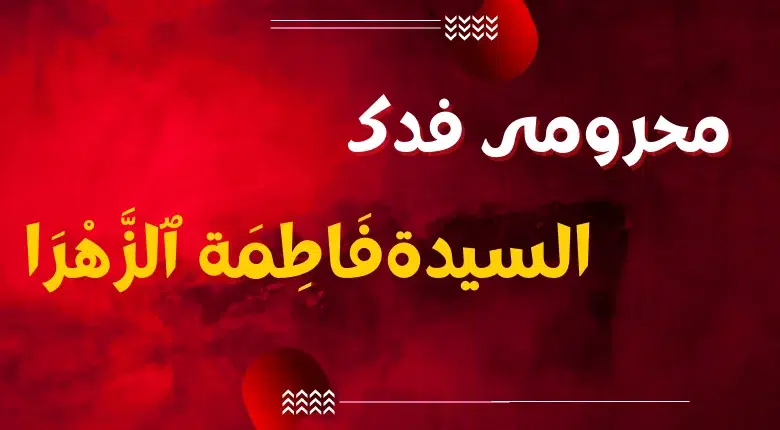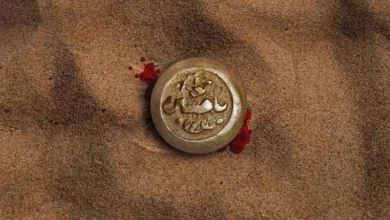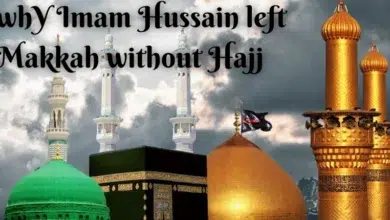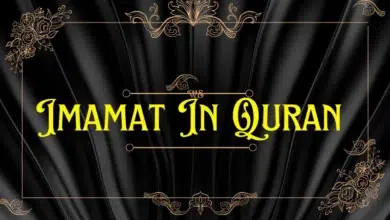
Fidak is one of the saddest and most chaotic story in the life of Hazrat Fatimah (sa) the beloved daughter of Holy Prophet (pbuh). It has the most grieved effect on the family of the Prophet (p.b.u.h.) , as well as in the history of Islam as a whole. It’s full of political plots and ups and downs, and it’s a way to learn about some of the important mysteries of early Islam.
Many historians and writers have said that “Fidak” was a thriving, fertile village in the land of “Hejaz” near Khaibar, which was two or three days’ journey from Medina. Some have said that this distance was 140 kilometres. In “Fidak,” there was a bubbling spring and many date palms, and after Khaibar, it was known as the stronghold of the Jews in “Hejar.”
How this nice, wealthy town, Fidak, was given to the Holy Prophet (p.b.u.h.) is well known. When the Messenger of God (p.b.u.h.) came back from conquering Khaibar, God put fear and panic in the hearts of the stubborn Jews who lived in Fidak. They sent a person to the Prophet (p.b.u.h.) who made a peace offer to him. In exchange for giving him half of Fidak, the Holy Prophet (pbuh) agreed to the peace pact and signed it.
As a result,Fidak became the property of the Prophet (p.b.u.h.). This is because a clear verse in the Quran says that anything the Muslims get without fighting is the Prophet’s (p.b.u.h.) exclusive right and, unlike the spoils of war, is not split. So, the Prophet (pbuh) took Fidak and used its money to help tired travelers and other people in need.
Here is the brief translation of Quranic verse in refference of Fidak:
“And whatever Allah gave His Apostle back from them, you didn’t move a horse or a riding camel against it. But Allah gives His Apostles power over whomever He wants, and Allah has power over everything.”
“Everything that Allah gave back to His Apostle from the people of the places is for Allah and the Apostle, as well as for relatives, children, the poor, and travellers.”
Chapter 59 (from “Translation of the Quran-e-Majid”) “Hashr”
God said, “Then give the next of kin what is right.” (Taken from “Translation of the Quran-e-Majid”) Chapter 30: “Rum”
“Because this verse was shown to the Holy Prophet (pbuh), the Apostle of Allah (pbuh) gave Fidak to Hazrat Fatimah (sa) while He was still alive. (Because God had shown him this verse, the Apostle of God (pbuh) told Fatimah,
“O Fatimah, Fidak is yours.”
Ali (as) said, “Of course, all we had under this sky was Fidak, but some people wanted it and others didn’t. “Allah, in the end, is the best judge.”
This has been talked about by and in their books, among others.
Also, both Tabari’s book and Ibn Athir’s book “Kamel” talked about this. A lot of scholars also said that the Prophet (p.b.u.h.) gave Fidak to the Lady of Islam, Hazrat Fatimah Zahra (as), when he was still alive.
Jalal-Al-Din Sayuti
Many commentators, including the famous Sunni commentator Jalal-Al-Din Sayuti, have quoted “Abu Saeed Khadri” as saying that because this verse was passed down, the Prophet of God (pbuh) asked for Hazrat Fatimah(as) and gave Fidak to her. Here are the words of this old story:
“When God said, “O Prophet, give your relatives what they deserve,” the Apostle of God (p.b.u.h.) gave Fidak to Hazrat Fatimah (sa).
Ibn Abbas
Under the same line, “Ibn Abbas” tells another story that has the same information.
Amir al Momeneen (as) said about Fidak in “Nahjul Balagha”: “Of course, all we had under this sky was Fadak, but some people wanted it and others didn’t want it. Allah, in the end, is the best judge.”
This shows that Amir al Momeneen Ali (as) and Hazrat Fatimah Zahra (as) were in charge of Fidak during the time of the Holy Prophets (p.b.u.h.). But later, a group of Hakem’s jealous men feasted their eyes on it, and Imam Ali (as.) and His wife, the Lady of Islam, were forced to look past it. Of course, they did not choose to look past it. If this wasn’t true, God’s role as judge, i.e., to say, would have been pointless.
A lot of the best Shia scholars have also talked about traditions connected to this part in their own books that people trust. You could mention the late “Kolainey” in “Kafey” and the late “Sadug” in their commentaries and You can also mention a large group of other experts in books of commentaries, history, and customs, but listing all of them would take too long.
Let’s find out why they took Fidakaway from Hazrat Fatimah (sa) and why.
Why Fidak was occupied by the rulers?
“Of course, all we had under this sky was Fidak, but one group of people wanted it too much, and the other group wouldn’t give it to them. Allah, in the end, is the best judge.”
This shows that Imam Ali (as) and Hazrat Fatimah Zahra (as) were in charge of Fidak during the time of the Prophets (p.b.u.h.). But later, a group of Hakem’s jealous men feasted their eyes on it, and Imam Ali (as) and His wife, the Lady of Islam, were forced to look past it. Of course, they did not choose to look past it. If this wasn’t true, God’s role as judge, i.e. to say, would have been pointless.
A lot of the best Shia scholars have also talked about traditions connected to this part in their own books that people trust. You could mention the late “Kolainey” in “Kafey” and the late “Sadug” in their commentaries and in You could also mention a large group of other experts in books of commentaries, history, and customs, but listing all of them would take too long.
Let’s find out how they took Fidak away from Hazrat Fatimah (sa.) and why?
The political reasons :
The taking of Fidak from the Lady of Islam, Hazrat Fatimah Zahra (sa ), was not just about money. Instead, the political issues that ruled the Islamic community after the HolyProphet (p.b.u.h.) death were more important than the economy. In fact, Fadak can’t be removed from the other things that happened during that time. On the contrary, it is a part of a long chain and a part of a current that covers everything!
This major historical usurpation can be explained by the following:
1. It was thought that having Fidak in the hands of the Prophet’s family would make a big difference for them. This in itself was proof of their high status and greatness in God’s eyes, and it showed how close they were to the Prophet (pbuh). This is especially true because, according to the Shia and Sunni traditions stated above, when the Quranic verse was revealed, the Prophet (p.b.u.h) sent for Hazrat Fatimah (sa) and gave her the land of Fadak.
2. With this history in mind, it’s clear that if Fidak was in the hands of the Prophet’s family, people would look for other traces of the Prophet in this family, especially when it came to the caliphate or the Prophet’s heir. Those who wanted to give the caliphate to someone else could not put up with this.
3. This issue was also important from a business point of view, and it had an effect on how it was handled politically. This was because Imam Ali (as) and his allies would have less political power if their economic situation got worse. Another way to look at it is that having Fidak in their possession gave them access to tools that could have helped them with the issue of guardianship (leadership).
4.This was like how Hazrat Khadijeh’s wealth helped Islam grow at the start of the Prophet’s (p.b.u.h.) mission.It is common practise all over the world to put an important person or country under an economic boycott when they want to cut them off.
In the history of Islam, we learn about this in the story of “Abu-Talib’s camp” and the harsh economic pressure that the unbelievers of Quraish put on the Muslims.
In the reading of the Quranic chapter “The Hypocrites,” under the verse: “If we go back to Medina, the strong will get rid of the weak there,”
This is a reference to a similar scheme by hypocrites that God’s kindness foiled. So, it’s not strange that the Prophet’s enemies would try to steal this investment from his family, isolating them and robbing them of all their money. If they had been ready to give Fidak to Hazrat Fatimah Zahra (sa) as her property or a gift from the Holy Prophet (p.b.u.h.) it would have been easy for her to also ask them about the caliphate.
In his report of the “Nahjul Balagha,” “Ibn Abil-Hadeed Motazaly” brings up this point in a subtle way. He says: I asked my religion master in Baghdad, Ali-bin-Fareghie, “Was Fatimah (sa) telling the truth when she said she owned Fidak?”
“Yes,” he said.
Then I asked, “If she was honest with the first caliph, why didn’t he give her Fidak?”
He then smiled and said something beautiful, subtle, and thought provoking, even though he didn’t usually talk like this:
“If Hazrat Abu Bakr had given Fidak to Hazrat Fatimah (sa)when he heard her claim, she would have come to him the next day and asked for the caliphate for her husband! She would have removed him from his post, and he would have done the same. He would have had no way to defend himself because, by giving “Fadak,” he would have agreed that whatever Hazrat Fatimah (sa) said was true, without needing proof or evidence.
Then Ibn Abil Hadeed says, This clear statement by two Sunni scholars is live proof of the “political essence” of the Fidak story.If we look at what happened to this village in the first few decades of Islam’s history, when it changed hands often and each ruler had a different role in relation to it, we can better understand what happened. God willing, we will talk about this in what comes next.




